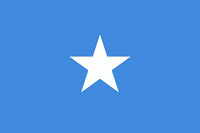Somalia
Somalia became independent from a merger of British and Italian Somaliland to form the Somali Republic. British Somaliland became independent on 26 June 1960 and Italian Somaliland became independent from Italian-administered UN trusteeship on 1 July 1960.
In 1969 a miltary coup headed by Mohamed Siad Barre introduced authoritarian socialist rule characterized by the persecution, imprisonment and torture of political opponents and dissidents. This regime collapsed in 1991, resulting in turmoil, factional fighting, and anarchy.
In May 1991, northern clans declared an independent Republic of Somaliland. Although not recognized by any government, this entity has maintained a stable existence and continues efforts to establish a constitutional democracy, including holding municipal, parliamentary, and presidential elections.
The neighboring semi-autonomous state of Puntland has been self-governing since 1998 but does not aim at independence; it has also made strides toward reconstructing a legitimate, representative government but has suffered some civil strife.
In 2000, the Somalia National Peace Conference (SNPC) held in Djibouti resulted in the formation of an interim government, known as the Transitional National Government (TNG). When the TNG failed to establish adequate security or governing institutions, the Government of Kenya, under the auspices of the Intergovernmental Authority on Development (IGAD), led a subsequent peace process that concluded in October 2004 with the election of Abdullahi Yusuf Ahmed as President of a second interim government, known as the Transitional Federal Government (TFG) of the Somali Republic.
President Yusuf resigned late in 2008 during United Nations-sponsored talks between the TFG and the opposition Alliance for the Re-Liberation of Somalia (ARS). In January 2009, following the creation of a TFG-ARS unity government, Ethiopian military forces, which had entered Somalia in December 2006 to support the TFG in the face of advances by the opposition Islamic Courts Union (ICU), withdrew from the country.
Parliament elected Sheikh Sharif Sheikh Ahmed, as president on 31 January 2009, in Djibouti. The creation of the TFG was based on the Transitional Federal Charter (TFC), which outlines a five-year mandate leading to the establishment of a new Somali constitution and a transition to a representative government following national elections. However, in January 2009 the TFP amended the TFC to extend TFG's mandate until 2011. The transition process ended in September 2012 when clan elders replaced the TFP by appointing 275 members to a new parliament who subsequently elected a new president, Hassan Sheikh Mohamud.
Somalia currently has a mixed legal system of civil law, Islamic law, and customary law (referred to as Xeer), which includes the payment of diya or blood money by clans.
Somalia had a constitution dating from 1979; a new provisional Constitution was approved on 1 August 2012.

